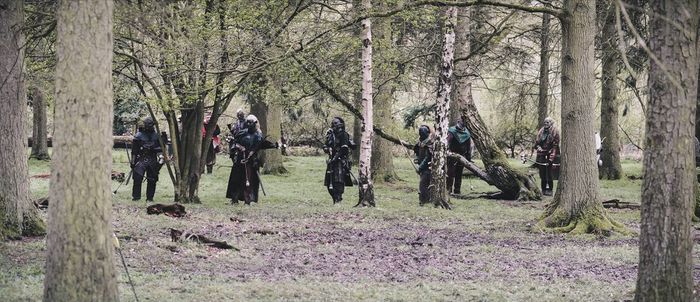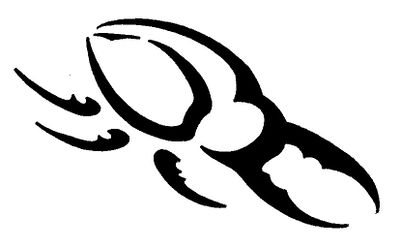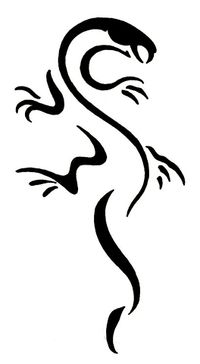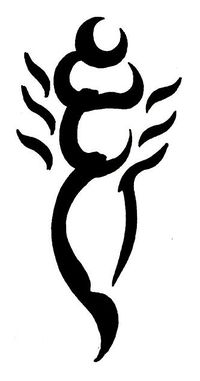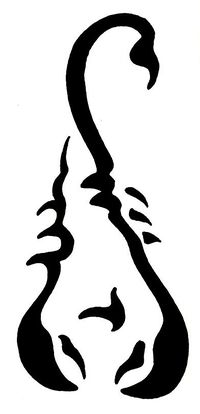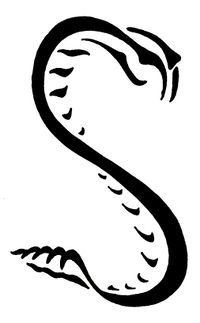Arkad
Overview
This page covers what little is known by Imperial citizens about the elite Druj troops. Most of this information is not widely known across the Empire - but soldiers and commanders who have fought the Druj before, or those unfortunate enough to have been enslaved, might be familiar with it.
Players who are interested in getting more involved in monstering at Empire can create their own elite monster unit (EMU) by choosing one of the known forces listed below. The list is deliberately limited - the Druj have deliberate weaknesses in the way they fight, as well as strengths - so it is not possible for players to create a new arkad.
The Arkad
The most promising young Druj are recruited into one of the five arkads, each of which operate their own lodges throughout Druj lands. Those who are chosen face a dangerous initiation rite, a mix of Druj mysticism coupled with powerful narcotics prepared for them by the tepel. Not all the warriors who take this rite survive. Membership of an arkad confers status and prestige on the new recruits and brings them closer to the centre of power in Druj society. The tepel run the lodges, providing the members with potent herbs and brews needed for their spiritual rites and giving out instructions and orders sent from their masters, the buruk tepel, the rulers of Druj society.
Like the Druj clans from which they are drawn, each arkad has their own unique totem creature, a venomous reptile, bird, insect, or other beast. Members of a lodge train to fight together on the battlefield and frequently employ tactics that emulate a particular trait of their totem creature. The animal is also upheld as the perfect example of a particular trait favoured in battle by the arkad.
The tepel ensure that members of the arkad have the best weapons and armour available. Along with their banners and shields, these are often decorated with a stylized representation of the arkad's totem creature. In battle their different fighting skills tend to complement each other and most Druj armies are built around groups of warriors drawn from each arkad lodge.
Pakkad
The orcs of the Pakkad are always well equipped and better armoured than the warriors of other arkad. These brutal fighters may wield any weapon that suits their purpose, but all wear the heaviest armour they can get their hands on. Some lodges keep slaves who can forge fine weapons and armour for their warriors, but others take theirs from their defeated foes which can give the unit a ramshackle and incoherent appearance. They dress as fearsomely as possible, using body parts, flayed skin, bones and skulls as decoration. A favoured ritual among the Pakkad is to smear their armour with blood before a battle, a practice that has led to the Pakkad being known as "the Bloodied".
In battle the Pakkad are often directed to provide protection for the Het commander or another notable Druj on the field. Their devotion means they are quick to throw themselves into harm's way to ensure the survival of the one they have been ordered to protect. If no protection is needed they may be used secure and hold key objectives, but they also act as a potent, heavily armoured and shock unit that can smash into enemy lines or eliminate exposed high-value targets. With this in mind, the Pakkad are often held in reserve until the enemy is already weakened and the leader is ready for them to strike with brutal force.
The Pakkad embody the aspect of the Black Hide Beetle, their armour and weapons reflecting the creature's thick chitinous plates and sharp mandibles. These beetles are found in small social groups that, when threatened, will form up around the dominant beetle and ward off predators.
Chikad
The Chikad are elite skirmishers. They harass enemy formations many times their size, picking off lone individuals, slowing the enemy, and forcing them to spend valuable time and resources tending to their crippled and poisoned comrades. A Chikad force will often feign engagement with a foe, only to break and flee at the first sign of resistance. If all goes to plan, the distracted enemy is then taken by surprise by a flank attack from another Druj force.
The leaders of the Chikad are known to be devious tacticians. They often conceal themselves in undergrowth or watch an engagement from the treeline, directing various elements of their force from relative safety. Large forces of these skirmishers generally break up into smaller groups, assaulting enemy lines from different angles and with different tempos. Even when they are outnumbered this strategy can make it hard for Imperial forces to bring their full might to bear on any individual group of attackers.
Chikad units vary greatly in their appearance and the equipment they carry, and are among the most adaptable of the arkad. Whilst they favour medium armour, some groups will wear light leathers and padded jacks to allow them to stay fast and mobile. Other units may at times don chain vests and plate armour on their limbs, turning themselves into a heavier force that can overcome weaker foes very effectively. Where possible their tepel provide the Chikad with poison to smear on their weapons so that even the smallest wound has a chance to kill or incapacitate an enemy.
The pack-hunting Razor Skink is the revered totem of the Chikad. These lizards are fast hunters whose hides are festooned with bony blades, barbs and spiny projections. They chase down prey much larger than themselves, slashing at vulnerable bellies and legs, slowly wearing the animal down until the pack is able to begin feasting on the exhausted creature.
Hupul
- It is not possible to form an Elite Monster Unit composed entirely of Hupul
- Hupul can be played by members of an EMU after consultation with the Battle Team
The Hupul fulfil a pivotal role in the Druj forces, operating as both forward scouts and skilled hunters. They often operate as a vanguard force of archers, slinking along the sides of a battle to unleash shot after shot into the ranks of the enemy. Sometimes they try to bring down key heroes,or vital support troops. They especially target healers, knowing that their loss can sow panic among the enemy. Whatever their target, they avoid direct engagements wherever possible. Constantly on the move, they always endeavour to flank their enemy, or draw them into ambushes, and as much as possible remain in close communication with their commanders.
On campaign they may be called on to operate away from the army for weeks at a time, and so strive to be as self-sufficient possible. As a result all Hupul are adept survivors, capable of avoiding the enemy left to their own devices. Most carry herbs or potions provided for them by the tepel, and adopt a distinctive style of dress intended to allow them to move unseen through the wilderness. More so than other Druj, they favour natural coloured open robes and ragged cloaks that help them to hide in ambush.
The totem of the Hupul is the Deathstinger, a deadly insect found in the eastern Barrens and the Mallum. These large red-and-black vespids can grow to the size of a dove or sparrowhawk and are commonly found in small groups. Brightly coloured, fast in flight, and practically fearless, a pack can easily overcome an unwary human. Travellers in the areas they frequent know to flee as soon as they hear the distinctive low-pitched buzzing the creatures make. Moving in small groups these oversized hornets hunt down their prey, darting in from just beyond reach to deliver vicious stings before flying out of harm's way. Their barbed stingers tear the skin and their venom thins the blood and causes the heart to begin beating faster and faster. Depending on size and constitution more than half a dozen or so stings is usually fatal as the heart literally explodes in the chest or they expire from massive blood loss. The bodies of their victims are left where they fall until the natural processes of rot and decay have made them more palatable to the vicious territorial killers.
Vikari
Those Druj that demonstrate magical aptitude who are not claimed as apprentices by the powerful Ghulai are usually inducted into the ranks of the Vikari. This arkad draws on the aspect of the Green Forest Scorpion, weakening, poisoning and entangling their foes. They favour hit and run tactics, combining a fast assault and a swift retreat before their lack of armour and resilience can be used against them.
As a Vikari gains status they will seek to craft a set of mage armour to protect them in battle, embellishing it with all manner of scorpion symbols, bright green splashes and the preserved chitin, pincers and tails of their scorpion totem. If they survive long enough the orc may add an elaborate headdress that takes on the shape of a scorpion, with pincer-like cheek guards and a tail that curves up and over the top of their head.
When deployed a unit of Vikari fights in two ranks. The front rank, known as the claws, is comprised of arcane weapon users who can cripple their opponents as well as harry them with weakening spells. The second rank, called the tails, then use their mage staffs to entangle their foes or ravage them with venomous magics.
The Green Forest Scorpion is just one of dozens, if not scores, of different scorpion species found in the Mallum. These fast-footed creatures are very aggressive and strike without provocation, delivering poisonous stings that slow or even paralyse their prey. They tear at their victims with their razor-sharp claws, inflicting bleeding wounds, before retreating. They are particularly single-minded; a green forest scorpion has been known to pursue prey for vast distances following their initial attack, continuing to claw and sting at fleeing prey, waiting for it to finally expire of blood-loss, accumulated venom, or terrified exhaustion.
Kallad
- The Kallad are played by our Skirmish Team and are not a player monster option
In some ways the Kallad are the most feared of all Druj - even warriors of other arkad tread lightly around these single-minded killers. All the arkad take their orders from the buruk tepel, but it is the Kallad that the rulers of the Druj employ when they wish to openly discipline their subordinates. The Druj do not punish failure that could not have been foreseen or averted, but those whose failings bring defeat will soon meet with members of the Kallad. Executions or torture are brutal and carried out in public, providing an object lesson of the need to avoid repeating the mistakes of the condemned.
In battle the Kallad operate separate from the main body of the Druj forces. They can often be seen stalking through the woodland after lone foes, or descending on enemy soldiers who have been left behind by their comrades. The lucky ones receive a swift death, those less fortunate face an agony of torture before they return to the Labyrinth. A fallen Highguard scout might have their legs cleaved as they lie on the ground, a Dawnish knight errant may have daggers driven into their flesh whilst having poisons poured into their mouth. These murderers will often taunt their foes by hauling fallen comrades to their feet, lashing them to trees, before they are eviscerated. While cruel, these brutal murders are intended to serve a purpose. By tormenting their prisoners, the Kallad try to provoke their enemies into rash and costly attempts to save the lives of their friends.
This arkad take the Coiled Shrike as their totem. This terrible creature is not a bird but a snake that lurks in trees, waiting for prey to pass by, believed by some scholars to be a distant relative of the jaculi native to the tropical jungles of the far west. When the moment comes to strike, the snake uncoils its body to leap from the branch. Only the most skilled tepel can save those bitten by the terrible fangs from an agonising death - the Shrike's necrotic poison causes the victim to swiftly rot while still alive and is said to be one of the most painful experiences imaginable. Victims of the Coiled Shrike often beg for death or take their own lives to escape the unspeakable torment the venom inflicts.
Herbalism Skills
The elite Druj warriors who train with the arkad lodges work closely with the tepel. Away from the battlefield, the warriors often help gather and prepare valuable herbs. As a result, any member of the arkad who shows aptitude is given limited training by the tepel, learning how to treat and staunch wounds sustained in battle. While they will never match the abilities of a fully trained physick, they can use this training to get other warriors healed and back into battle. In battle the tepel provide the arkad with limited supplies of True Vervain to heal the wounds of their comrades.
